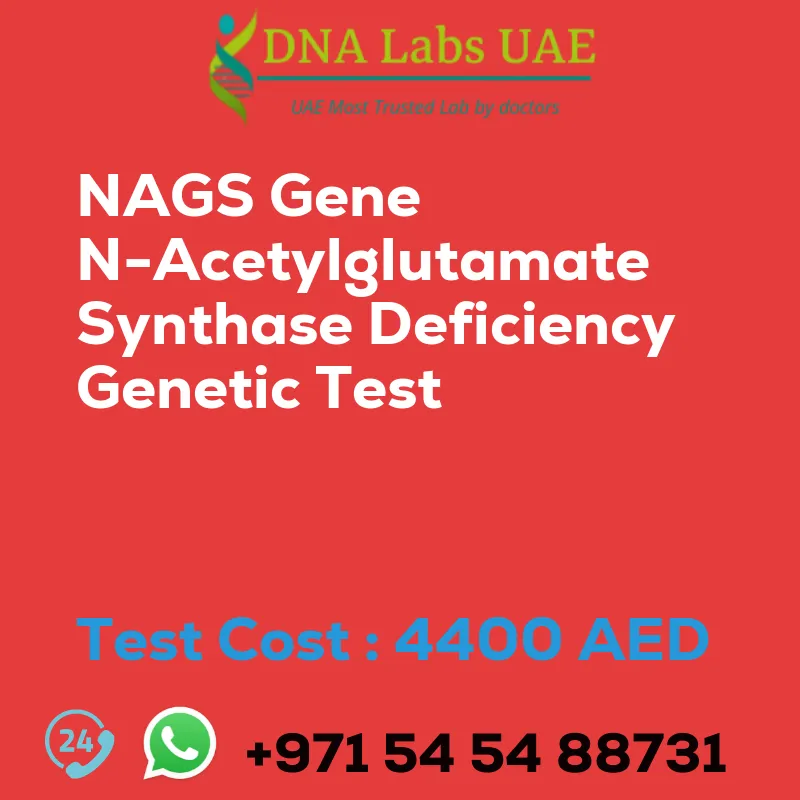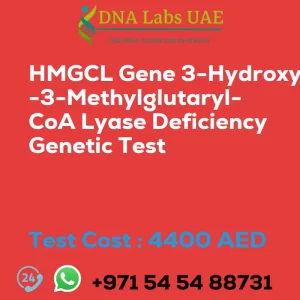NAGS Gene N-acetylglutamate synthase deficiency Genetic Test
Components: NAGS Gene N-acetylglutamate synthase deficiency Genetic Test
Price: 4400.0 AED
Sample Condition: Blood or Extracted DNA or One drop Blood on FTA Card
Report Delivery: 3 to 4 Weeks
Method: NGS Technology
Test type: Metabolic Disorders
Doctor: General Physician
Test Department: Genetics
Pre Test Information: Clinical History of Patient who is going for NAGS Gene N-acetylglutamate synthase deficiency NGS Genetic DNA Test. A Genetic Counselling session to draw a pedigree chart of family members affected with N-acetylglutamate synthase deficiency.
Test Details
NAGS gene, also known as N-acetylglutamate synthase, is responsible for producing an enzyme called N-acetylglutamate synthase. This enzyme plays a crucial role in the urea cycle, which is responsible for removing toxic ammonia from the body.
N-acetylglutamate synthase deficiency (NAGS deficiency) is a rare genetic disorder that affects the urea cycle. It is an autosomal recessive disorder, meaning that an individual must inherit two copies of the mutated gene (one from each parent) to develop the condition.
Individuals with NAGS deficiency have a reduced or absent N-acetylglutamate synthase enzyme activity, which impairs the proper functioning of the urea cycle. This leads to the accumulation of ammonia in the body, causing a range of symptoms such as lethargy, poor feeding, vomiting, seizures, and developmental delay. If left untreated, NAGS deficiency can be life-threatening.
NGS (Next-Generation Sequencing) genetic testing is a method used to identify mutations in the NAGS gene. This test can analyze multiple genes simultaneously and detect various types of genetic alterations, including single nucleotide variants, small insertions or deletions, and larger structural variations.
NGS testing allows for a more comprehensive and efficient analysis of genetic disorders compared to traditional sequencing methods. By identifying mutations in the NAGS gene through NGS genetic testing, healthcare professionals can confirm a diagnosis of NAGS deficiency. This information is crucial for appropriate management and treatment of the condition, including dietary modifications and potentially the use of medications to lower ammonia levels.
| Test Name | NAGS Gene N-acetylglutamate synthase deficiency Genetic Test |
|---|---|
| Components | |
| Price | 4400.0 AED |
| Sample Condition | Blood or Extracted DNA or One drop Blood on FTA Card |
| Report Delivery | 3 to 4 Weeks |
| Method | NGS Technology |
| Test type | Metabolic Disorders |
| Doctor | General Physician |
| Test Department: | Genetics |
| Pre Test Information | Clinical History of Patient who is going for NAGS Gene N-acetylglutamate synthase deficiency NGS Genetic DNA Test A Genetic Counselling session to draw a pedigree chart of family members affected with N-acetylglutamate synthase deficiency |
| Test Details |
NAGS gene, also known as N-acetylglutamate synthase, is responsible for producing an enzyme called N-acetylglutamate synthase. This enzyme plays a crucial role in the urea cycle, which is responsible for removing toxic ammonia from the body. N-acetylglutamate synthase deficiency (NAGS deficiency) is a rare genetic disorder that affects the urea cycle. It is an autosomal recessive disorder, meaning that an individual must inherit two copies of the mutated gene (one from each parent) to develop the condition. Individuals with NAGS deficiency have a reduced or absent N-acetylglutamate synthase enzyme activity, which impairs the proper functioning of the urea cycle. This leads to the accumulation of ammonia in the body, causing a range of symptoms such as lethargy, poor feeding, vomiting, seizures, and developmental delay. If left untreated, NAGS deficiency can be life-threatening. NGS (Next-Generation Sequencing) genetic testing is a method used to identify mutations in the NAGS gene. This test can analyze multiple genes simultaneously and detect various types of genetic alterations, including single nucleotide variants, small insertions or deletions, and larger structural variations. NGS testing allows for a more comprehensive and efficient analysis of genetic disorders compared to traditional sequencing methods. By identifying mutations in the NAGS gene through NGS genetic testing, healthcare professionals can confirm a diagnosis of NAGS deficiency. This information is crucial for appropriate management and treatment of the condition, including dietary modifications and potentially the use of medications to lower ammonia levels. |








